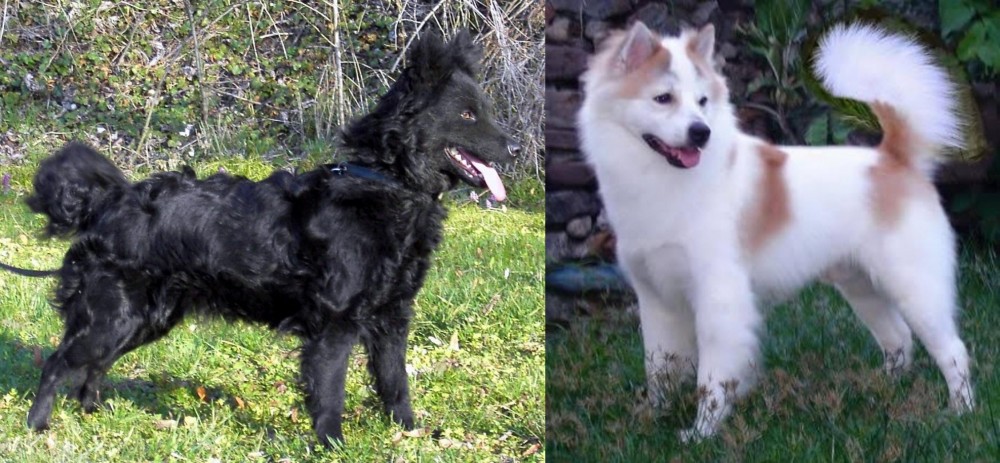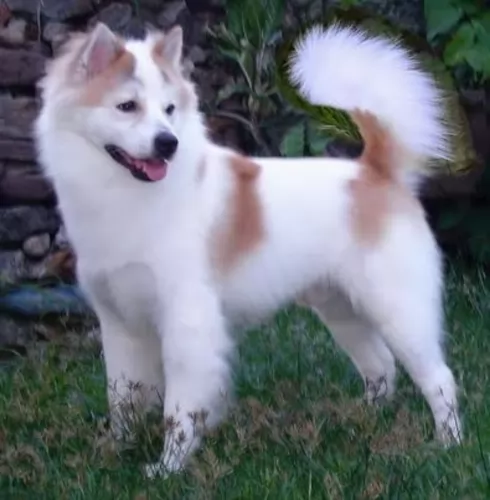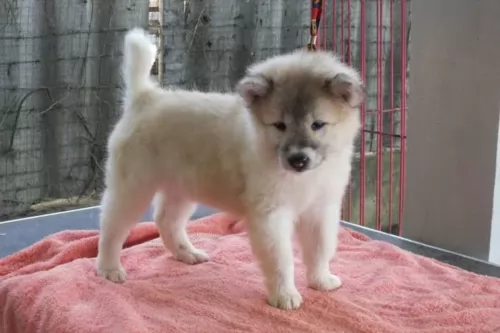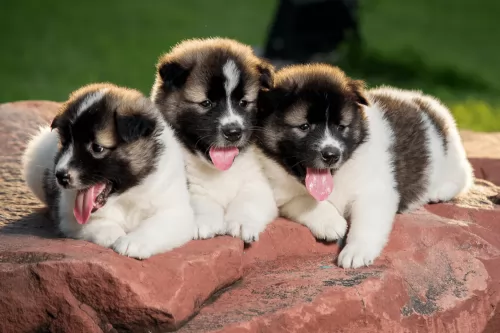 Petzlover
Petzlover Mudi is originated from Hungary but Thai Bangkaew is originated from Thailand. Mudi may grow 6 cm / 2 inches shorter than Thai Bangkaew. Mudi may weigh 12 kg / 26 pounds lesser than Thai Bangkaew. Both Mudi and Thai Bangkaew has same life span. Both Mudi and Thai Bangkaew has almost same litter size. Both Mudi and Thai Bangkaew requires Moderate Maintenance.
Mudi is originated from Hungary but Thai Bangkaew is originated from Thailand. Mudi may grow 6 cm / 2 inches shorter than Thai Bangkaew. Mudi may weigh 12 kg / 26 pounds lesser than Thai Bangkaew. Both Mudi and Thai Bangkaew has same life span. Both Mudi and Thai Bangkaew has almost same litter size. Both Mudi and Thai Bangkaew requires Moderate Maintenance.
 Sometime between the 4th and 6th centuries, the Great Migration – a variety of dogs came to live in the Carpathian Mountains on the Great Hungarian Plain. This migration period brought sheepdogs and herders brought by shepherds. These dogs were of two sizes both small and large. The smaller ones were bred together – Pumi, Puli, and Mudi. Because of this, these breeds share the same history, with the Mundi being the oldest of them all.
Sometime between the 4th and 6th centuries, the Great Migration – a variety of dogs came to live in the Carpathian Mountains on the Great Hungarian Plain. This migration period brought sheepdogs and herders brought by shepherds. These dogs were of two sizes both small and large. The smaller ones were bred together – Pumi, Puli, and Mudi. Because of this, these breeds share the same history, with the Mundi being the oldest of them all.
The Mundi was finally separated from the other breeds about 1930 when Dr. Deszo Fenyesi began to breed them. It was in 1966 when the F.C.I. finally approved the standard for the breed. Still then as today, there were not many breeders developing the Mudi. They are working dogs – farm dogs – herders, guard dogs and ratters. He is also known as a tracker, with the majority of the breed living in Hungary.
As the Mudi was bred separately from the Pumi and the Puli, differences between the breeds became clear. Many Mudi are born with a stump or no tail at all. The Mudi is not a great dog for the first timer. He is stubborn, assertive and needs a lot of socialization and exercise. In 2004 breeders in the United States created the Mudi Club of America to preserve the breed and foster responsible ownership. This is a clever, active and keen breed, very loyal to his family but wary of strangers. The United Kennel Club recognized the breed in 2006.
In Hungary, these are still a breed of herding dogs capable of running 500 sheep at a time. They are versatile, courageous, intelligent and agile. They are great in obedience trials, agility, and flyball. In Finland and the United States, they also work as search and rescue dogs.
 The Thai Bangkaew breed comes from a small village in the Bang Rakarn District of the Phitsanulok Province, in Thailand. The breed is named after that village of Bangkaew. A wild dog was crossed with a Buddhist abbot’s black and white female. Today’s Bangkew is the direct result of breeding only from the litters produced from these original two. Some believe the wild dog was a jackal that is now extinct. The breed is similar to a Spitz and is a good hunter and an intelligent family member. However they still maintain some of the wildness of the jackal.
The Thai Bangkaew breed comes from a small village in the Bang Rakarn District of the Phitsanulok Province, in Thailand. The breed is named after that village of Bangkaew. A wild dog was crossed with a Buddhist abbot’s black and white female. Today’s Bangkew is the direct result of breeding only from the litters produced from these original two. Some believe the wild dog was a jackal that is now extinct. The breed is similar to a Spitz and is a good hunter and an intelligent family member. However they still maintain some of the wildness of the jackal.
The Thai Bangkaew was developed to be a guard dog and alert their owners of any strangers or dangers. By 1957 the dog we know today we being developed through selective breeding. They are not recognized today by the AKC. These facts have made it a very rare breed that is hard to find outside southeast Asia. They are great outdoor companions.
 This is a medium size dog with an almost square profile. They have erect ears on wedge-shaped heads. He is not a strong boned but medium boned. That square profile is based in large part on their very square stance. Their muzzle is about half the length of their head and they have what is considered a “dare devil” expression in their dark, almond-shaped eyes. The color of the eyes is important and must match with the color of the dog or the standard is not met.
This is a medium size dog with an almost square profile. They have erect ears on wedge-shaped heads. He is not a strong boned but medium boned. That square profile is based in large part on their very square stance. Their muzzle is about half the length of their head and they have what is considered a “dare devil” expression in their dark, almond-shaped eyes. The color of the eyes is important and must match with the color of the dog or the standard is not met.
Merle fur – brown, brown speckled, blue eyes.
Brown or gray-brown fur – Brown eyes
Gray fur – gray eyes
What is not acceptable is having yellow eyes and black fur; pink eyes and white fur. The lips, eye rims, and nose must all have the same pigmentation. This should be black in all but the brown and brown-grey dogs. These dogs have brown noses, eye rims, and lips. The tail can be almost anything from full to bob. All are considered to be natural lengths for a Mudi.
Their coat is self-cleaning and won’t mat. It is on the long side. In fact, a short, flat, smooth coat is a disqualification from the standard. The color of the coat ranges from white to brown to gray, gray-brown, merle, golden, cream and white. Very little markings of any kind are usual.
 A compact and square dog, the Thai Bangkaew is a well proportioned breed with a gait that is smooth. They have a deep, wide chest with muscular and strong neck. The head is also square, the ears pointed and the eyes brown and average size. They have a double coat and a longer, thicker ruff. Their chest and back also have a ruff like a lion. The tail is plumed and carried up high and curves over the dog’s back. Their coat is water-repellent.
A compact and square dog, the Thai Bangkaew is a well proportioned breed with a gait that is smooth. They have a deep, wide chest with muscular and strong neck. The head is also square, the ears pointed and the eyes brown and average size. They have a double coat and a longer, thicker ruff. Their chest and back also have a ruff like a lion. The tail is plumed and carried up high and curves over the dog’s back. Their coat is water-repellent.
 Yes, they are great with children and love being a part of a large family or “pack”.
Yes, they are great with children and love being a part of a large family or “pack”.
They are extremely versatile and great at herding and guarding.
They are adaptable if you are. They don’t need to live in the country, but they need space to run and play.
They are highly intelligent but a little stubborn. Their ability to learn is high but you have to be the boss.
 The Mudi does face several of the problems that medium to large dogs often face and some eye issues as well.
The Mudi does face several of the problems that medium to large dogs often face and some eye issues as well.
 This is a very healthy breed with a relatively clean genentic pool. The dogs tend to be healthy. They have no congenital health issues. However they do contract some normal canine issues.
This is a very healthy breed with a relatively clean genentic pool. The dogs tend to be healthy. They have no congenital health issues. However they do contract some normal canine issues.
 The Mudi needs a high quality, medium breed puppy dry food and should be fed 3 or 4 times a day for a total of 1 and ½ to 2 cups.
The Mudi needs a high quality, medium breed puppy dry food and should be fed 3 or 4 times a day for a total of 1 and ½ to 2 cups.
The adult should be fed at least twice a day with an adult medium breed high-quality dry dog food. Don’t overfeed as the breed can have a tendency toward obesity.
They have great stamina and agility.
This is a working dog and like most herding dogs, they need a job and a lot of activity. Long walks every day and either a large yard or visits to a dog park. Involve them in herding activities or Barn Hunt if you can. Playing is their way of working when they are not herding real animals. So, if you want this breed, be sure you have time for playing with them. They are great at agility, flyball, obedience, frisbee trials, tracking and of course herding
 . Feeding the puppy Feed a high quality high protein puppy food for medium sized dog. Feed 2 cups in 3-4 meals per day.
. Feeding the puppy Feed a high quality high protein puppy food for medium sized dog. Feed 2 cups in 3-4 meals per day.
2.Feeding the adult Feed a high quality high protein adult food for medium sized dog. Feed 2.5 cups in 2 meals per day
4. Games and Exercises they need daily exercise and they love to swim. He loves to dig and is a climber as well. Good at herding, barnchase.